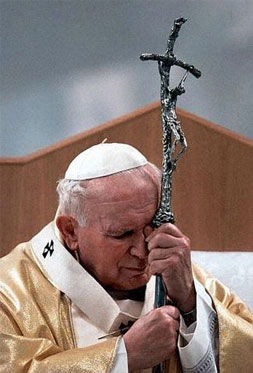By Nicole Neroulias
Religion News Service
NEW YORK — High-profile political leaders get Secret Service agents and police escorts to guard against assassins. Celebrities rely on bodyguards to shield them from overzealous fans.
When it comes to Pope Benedict XVI, who visits New York and Washington, D.C. April 15-20, both kinds of protection are equally needed.
“We work closely with the Vatican and the archdioceses to provide a comprehensive security plan, but we understand that millions of Catholics want to see him,” said Ed Donovan, a Secret Service spokesman. “It’s always a balance we have.”
During his six-day visit, Benedict will visit the White House, speak at the United Nations, pray at the former site of the World Trade Center and celebrate Mass at Washington’s Nationals Park, New York’s Yankee Stadium and St. Patrick’s Cathedral. The public may also spot the pope riding in the bulletproof vehicle known as the “popemobile.”
Ron Williams, a retired Secret Service agent who helped guard Benedict’s predecessor, Pope John Paul II, said the devoted throngs pushing for a glimpse of their spiritual leader amplify the dangers.
“There’s a different, euphoric atmosphere with the pope,” he explained. “You’ve got to worry about mentally ill people, you’ve got to worry about Islamic radical fundamentalists, and on top of that, you’ve got to be concerned about people who just want to touch him and overwhelm the protective detail around him by loving him.”
While the Secret Service once focused on protecting John Paul II from gunmen — the last assassination attempt on a pope was the 1981 shooting at the Vatican — modern security measures must guard against suicide bombers and terrorism plots that target the crowd, too.
Further heightening the risks associated with the first papal visit to America since the 9/11 terrorist attacks, this pope has particularly angered some Muslims with his controversial remarks about the Prophet Muhammad two years ago and his recent Easter baptism of a prominent Italian Muslim.
In an audio recording last month, al-Qaida leader Osama bin Laden said the pope has played a large role in a “new crusade” against Islam, and warns of a “severe” reaction to come.
Donovan declined to comment on whether the message had prompted any additional safety measures, however.
“We always strive to have a safe environment for our protectee,” he said.
But Williams, who now runs a private security consulting company, said only a highly specific, corroborated threat would change the pope’s plans.
“There’s all kinds of threats and that’s standard,” he said. “That comes with the turf. That happens with every presidential visit.”
More than 100,000 people have submitted to background checks in exchange for stadium Mass tickets, but Mathew N. Schmalz, associate professor of religious studies at the College of the Holy Cross, said worshipers may get frustrated or offended if security measures become a distraction during services.
“People are really looking forward to having the opportunity to connect personally with this pope,” he said, noting this is Benedict’s first trip to America since his election in 2005. “Certainly there should be metal protectors and so forth, but it’s a religious opportunity, so people might not be as patient with security measures as they would be if they were going to see the president.”
He added, “They may feel it’s a kind of violation of their spiritual journey.”
Copyright 2008 Religion News Service. All rights reserved. No part of this transmission may be distributed or reproduced without written permission.
More from Beliefnet and our partners

